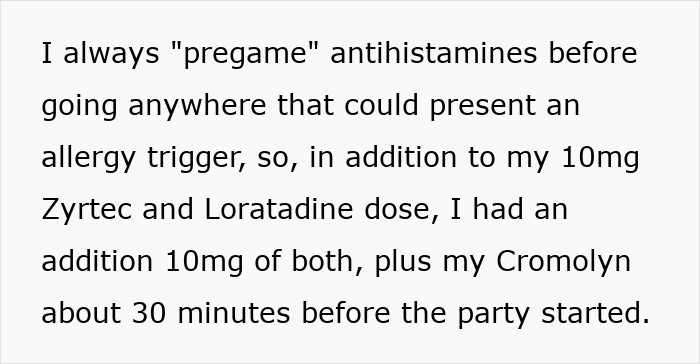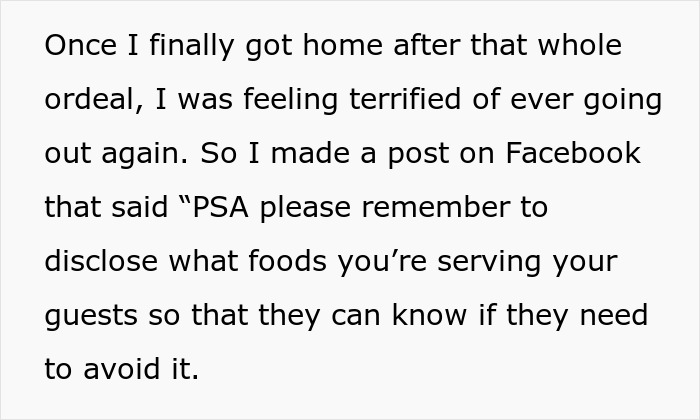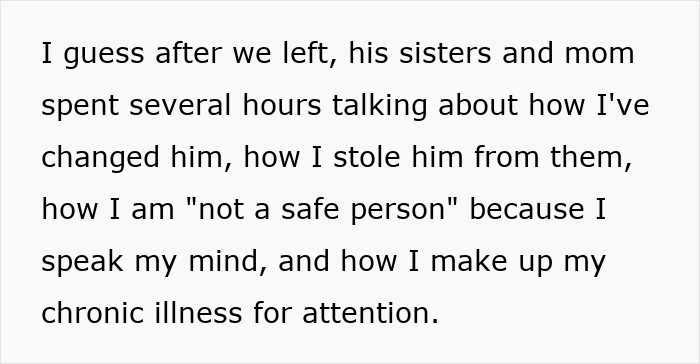Family dynamics can be complicated, and misunderstandings are bound to happen. But when malicious intentions and health problems enter the picture, even small incidents can lead to serious consequences.
And there’s a post on the subreddit r/JUSTNOMIL by platform user ImNotAWitch-ImUrWife that describes how dangerous these scenarios can be.
The woman says she has mast cell activation syndrome (MCAS), a condition caused by mast cells (mistakenly) alerting your immune system that there’s something harmful in your body. But her in-laws believe she’s faking it for attention. So during a party, her husband’s brother lied about what was in the food to see her reaction.
This woman had to use an EpiPen after her brother-in-law deliberately lied about the food that was being served at the family party
Image credits: Freepik (not the actual photo)
But her relatives are accusing her of causing unnecessary drama
Image credits: Jimmy Chan/Pexels (not the actual photo)
Image credits: Allen Beilschmidt sr./Pexels (not the actual photo)
Image credits: RDNE Stock project/Pexels (not the actual photo)
Image credits: ImNotAWitch-ImUrWife
It can be very challenging to live with MCAS
Image credits: Towfiqu barbhuiya/Pexels (not the actual photo)
Mast cells are a part of our immune system. Their usual function is to help protect the body from invading germs (pathogens — like parasites or viruses) or other harmful substances.
They sit in our tissues, and when they recognize something they think is harmful, they release histamine and other chemicals to activate the immune system and try to flush out the intruder.
Mast cell activation syndromes are divided into three groups: primary, secondary, and idiopathic.
Primary disorders of mast cell activation usually happen when there’s a problem with the mast cell or its parent cells, which causes an excessive production of mast cells. This problem may occur when there is a mutation in a gene called KIT. These primary disorders of mast cell activation include mastocytosis, monoclonal mast cell activation syndrome (MMAS), mast cell sarcoma, mast cell leukemia, and mastocytoma.
Secondary disorders of mast cell activation happen when the body encounters a trigger that causes it to produce too many mast cells. This trigger could:
- Involve IgE antibodies, like food, drugs, or venom;
- Be unrelated to IgE antibodies like drugs, physical activity, stress, or infections.
No one knows the exact cause of the idiopathic mast cell activation syndrome. The name comes from the fact that it’s not caused by any other disease or related to a clear allergy. People who have this syndrome might have a hard time pinpointing the exact thing that triggers the symptoms, and new triggers might come up a lot.
In general, many different symptoms affect lots of the body’s systems all at once. These can happen after eating foods, smelling certain fragrances, exercising, etc.
Some key symptoms include:
- Swelling
- Itching
- Rashes
- Inflammation
- Vomiting
- Chronic pain
- Flushing
- Diarrhea
- Constipation
- Sweats
- Abdominal pain
- Fatigue
But MCAS may also cause symptoms that involve the brain and nerves, including memory problems, headaches, balance problems, fainting, brain fog, anxiety, shortness of breath, mood swings, heart palpitations, and, as we learned from the study, can lead to a life-threatening reaction called anaphylactic shock.
In a comment our Redditor left under another post, she mentioned that her MCAS comes with postural orthostatic tachycardia syndrome, or POTS.
This condition results in too little blood getting to the heart when she stands up after lying down. It causes:
- Lightheadedness or fainting;
- A quick rise in heart rate, causing it to have 30 more beats per minute or a heart rate of over 120 beats per minute.
So this woman’s case is no joke.
Some people do fake their illnesses, but MCAS…?
Image credits: Pixabay/Pexels (not the actual photo)
To determine how big the problem of people faking illness really is, a team of researchers conducted a study based on survey data from the Netherlands.
975 adults participated in the study, and even though many believe that faking illness is something that happens only very rarely, the results paint a different picture.
The respondents said they believe about one in every three people (31.2%) fake illness to achieve some sort of goal. Participants also reported that 22.7% had a person in their family who had done this, 24.9% knew someone like this among their friends, and 15.4% said such a person was part of their neighborhood.
The highest percentage was reported for colleagues at work (38.9%). About 14.3% of participants in the study even admitted that they had faked illness themselves, with 55% having faked physical symptoms, 7.4% having faked mental symptoms, and 37.5% having faked both physical and mental symptoms. Most people who had faked illness themselves felt guilty about it (80.6%), and a few also felt that it was thrilling (16.5%).
However, tricking a doctor into writing you a note so that you can skip work is one thing. Faking a condition like MCAS in front of everyone you know for your entire life would be… a much bigger act. I mean, can you imagine convincing the paramedics to help you?
People who read the story had a lot to say about what happened
Thanks! Check out the results:
Total votes ·
Source link


























